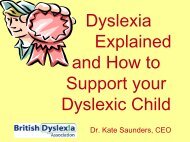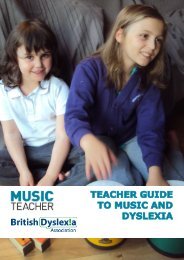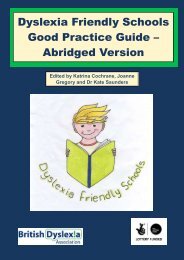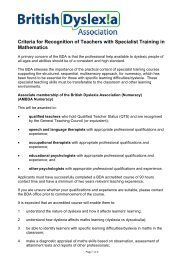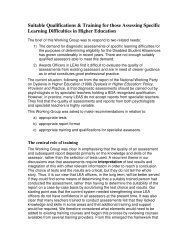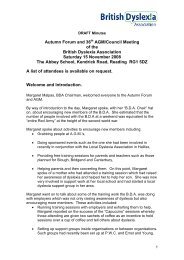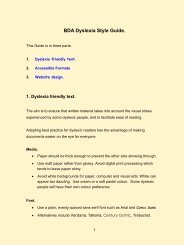Intervention for Dyslexia - The British Dyslexia Association
Intervention for Dyslexia - The British Dyslexia Association
Intervention for Dyslexia - The British Dyslexia Association
Create successful ePaper yourself
Turn your PDF publications into a flip-book with our unique Google optimized e-Paper software.
and Olson, 2000). Software designed <strong>for</strong> beginning readers, especially ‘talking books’<br />
(see Lewin, 1997, 1998, 2000; Underwood, 2000; Underwood & Underwood, 1998) and<br />
also programs designed to develop word recognition and text reading skills in older<br />
students (e.g. Davidson & Noyes, 1994; Davidson, Coles, Noyes & Terrell, 1991) have<br />
mainly relied on whole-word feedback.<br />
6.2.3 Integrated Learning Systems<br />
CAL is often seen at its most advanced in Integrated Learning Systems (ILSs). An ILS<br />
incorporates assessment and diagnosis of student skills, delivery of carefully structured<br />
learning materials via a computer network, continuous monitoring of per<strong>for</strong>mance and<br />
automatic adjustment of instruction where required, and generation of individual and<br />
group per<strong>for</strong>mance data <strong>for</strong> use by teachers and administrators (Willis, Stephens and<br />
Matthews, 1996; Brown, 1997). ILSs have been widely adopted in the USA, but the<br />
take-up in the UK has been more cautious, partly because they are very expensive, and<br />
partly because there have been reservations about their effectiveness. However, Van<br />
Dusen and Worthen (1994) argued that the dearth of positive results from evaluations is<br />
not necessarily because ILSs are inherently ineffective, but rather because<br />
implementation of the systems has been too weak. UK studies of ILSs have been<br />
evaluated by Wood and colleagues, who concluded that, while investigations have failed<br />
to produce overall convincing evidence <strong>for</strong> educational gains of ILSs, some studies have<br />
shown positive benefits (Wood, 1998; Wood, Underwood and Avis, 1999). Underwood<br />
(2000), in comparing an ILS and a talking book <strong>for</strong> developing reading skills of primary<br />
school children, found that both methods were highly motivating <strong>for</strong> children and<br />
resulted in gains in reading.<br />
Lewis (1999) has reviewed the evidence from eight different research studies on the use<br />
of ILS with students with learning difficulties in the UK. <strong>The</strong> results were mixed, but<br />
overall this analysis also failed to produce clear evidence that ILS, as used in these<br />
particular studies, has significant benefits <strong>for</strong> children with special needs. On the other<br />
hand, Williams (2001) reported a study of using ILS to develop skills of 200 secondary<br />
school pupils with poor literacy; improvement was noted in self-esteem as well as<br />
learning. However, perhaps most importantly, all these authors agree that there are<br />
good reasons to expect that the effects of an ILS will be mediated and strongly<br />
influenced by classroom practice. Miller, DeJean and Miller (2000) highlight how the<br />
embedded curricula in an ILS may sometimes be congruent with those of the school or<br />
the teacher, but often may be at variance with them, with potentially negative<br />
consequences.<br />
On the basis of current evidence there is little to support the use of ILS with dyslexic<br />
pupils. It would appear that, as a learning activity, ILS is too generic and insufficiently<br />
focused on the needs of pupils with SEN, although if properly integrated within the<br />
curriculum so that it complements conventional teaching, it might be a useful (if<br />
expensive) way of enabling non-SEN children to practise and apply their literacy skills.<br />
Clearly further research is required on this topic.<br />
6.3 Research on computer-based interventions with<br />
dyslexic children<br />
<strong>The</strong> most comprehensive review of the use of computer technology on literacy was<br />
conducted by Torgerson and Zhu (2003). Meta-analysis was limited to those with RCT<br />
<strong>Intervention</strong> <strong>for</strong> <strong>Dyslexia</strong> 125



